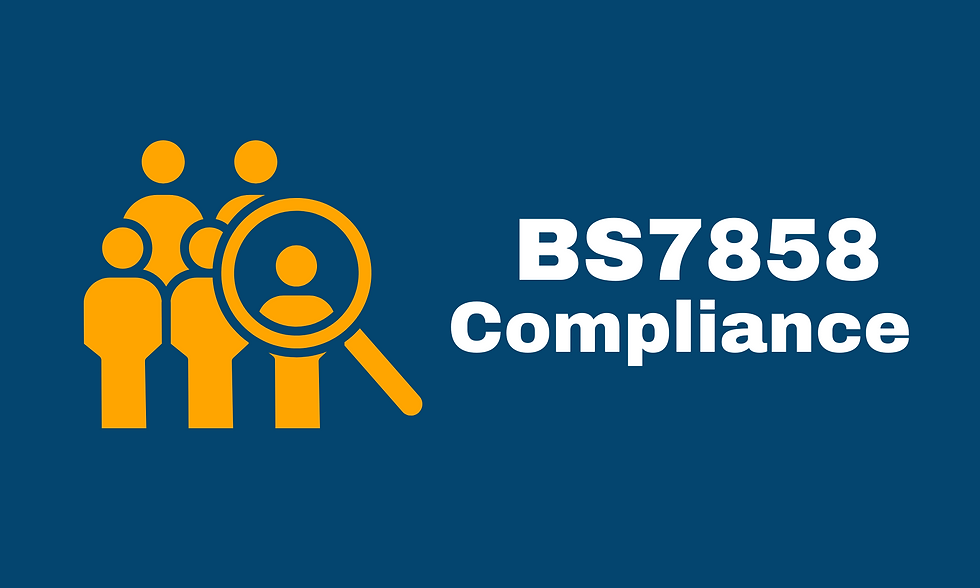Security Vetting in the Private Security Industry: A Deep Dive into BS7858
- James Consulting

- Sep 6, 2025
- 4 min read
When you step into the world of private security, whether as a close protection officer, CCTV operator, or event steward, one of the first hurdles you’ll face isn’t physical training or licensing, it’s vetting.
In fact, in many ways, vetting is the backbone of trust in the security industry.
After all, if a security professional is tasked with protecting people, property, and sensitive information, clients need confidence that the individual has the right background, integrity, and reliability.
This is where BS7858 security vetting comes in.

What is BS7858?
BS7858 is the British Standard for “Screening of individuals working in a secure environment.” It’s the gold standard for pre-employment screening in the private security sector, designed to ensure that only individuals who are trustworthy, dependable, and suitable are employed in sensitive roles.
The standard is not just a nice-to-have; it’s a requirement for most security jobs in the UK.
Employers are expected to follow BS7858 when recruiting for roles covered under the Private Security Industry Act 2001, such as:
Close protection officers
Security guards
Door supervisors
Key-holding and alarm-response staff
Control room operators
Why is BS7858 Important?
The private security industry deals with risk management at its core. From guarding high-profile events to patrolling critical infrastructure, the stakes are high. Employing someone without proper vetting could expose clients, assets, and the public to unnecessary danger.
Here’s why BS7858 is critical:
Trust and reputation: Companies must demonstrate to clients that their staff are reliable and vetted to a national standard.
Compliance and liability: Failing to vet staff properly can lead to serious legal and financial consequences for security providers.
Deterrence: Robust vetting discourages unsuitable individuals, including those with criminal intent, from entering the industry.
Think of it this way: A licence proves you are legally permitted to work, but BS7858 vetting proves you are safe to employ.
The BS7858 Vetting Process
The standard lays out a structured process to check an applicant’s suitability. Here’s what’s typically involved:
1. Identity Verification
Employers must confirm the applicant’s identity using official documents, such as a passport or driving licence. This ensures the individual is who they say they are.
2. Right to Work Check
Eligibility to work in the UK must be confirmed, in line with immigration laws.
3. Five-Year Career History
Applicants must provide a complete record of their employment, unemployment, or education for the last five years (or since age 16 if younger). Any gaps must be explained and verified.
4. Criminal Record Check (Disclosure and Barring Service - DBS)
Depending on the role, a Basic or Standard DBS check is required. While some minor offences may not automatically exclude someone, serious convictions can prevent employment.
5. Financial Probity Check
A credit check may be carried out to assess financial stability, as individuals under financial stress may be at higher risk of compromise or misconduct.
6. Character References
At least two personal or professional referees are usually required, ensuring that the applicant is vouched for by people who know them well.
7. Global Watchlists & Sanctions
For certain roles, checks against watchlists or sanctions databases may be conducted, especially where international work is involved.

How Long Does BS7858 Vetting Take?
The full process can take anywhere from 2 to 12 weeks, depending on the completeness of the applicant’s records and the responsiveness of referees. Some employers will grant conditional employment (under supervision) while vetting is finalised, but no one should be fully deployed until all checks are complete.
Common Challenges with Vetting
Unexplained gaps: Breaks in employment or education are red flags unless properly explained.
Incomplete references: Delays often occur when referees don’t respond.
International checks: Applicants who’ve lived or worked abroad may need additional verification, which can slow the process.
It’s vital for applicants to be honest and transparent from the start—discrepancies usually get flagged and can derail an otherwise successful application.
The Role of Employers
Employers have a duty not only to carry out the checks but also to document them properly. Records must be maintained for inspection by auditors, regulators, or clients. Many companies outsource vetting to specialist providers, but the responsibility for compliance always rests with the employer.
BS7858 and the SIA
The Security Industry Authority (SIA) sets licensing requirements, but it does not directly enforce BS7858. Instead, the SIA Approved Contractor Scheme (ACS) uses compliance with BS7858 as one of its key measures of quality.
In short:
SIA licence = legal requirement for the individual.
BS7858 vetting = operational requirement for the employer.

Final Thoughts
Security vetting may feel like a box-ticking exercise to some, but it’s far more than paperwork. It’s about protecting clients, the public, and the integrity of the industry itself.
If you’re applying for a job in the private security sector, understanding BS7858 helps you prepare:
Keep your records organised.
Be honest about your history.
Provide responsive referees.
For employers, BS7858 is not just a compliance exercise but a foundation of professional credibility. After all, in security, trust is everything, and BS7858 ensures that trust is built on solid ground.
✅ Takeaway: If you want a career in the private security industry, expect BS7858 vetting.
Embrace it, prepare for it, and see it as the professional standard that protects you, your employer, and the people you serve.



Comments